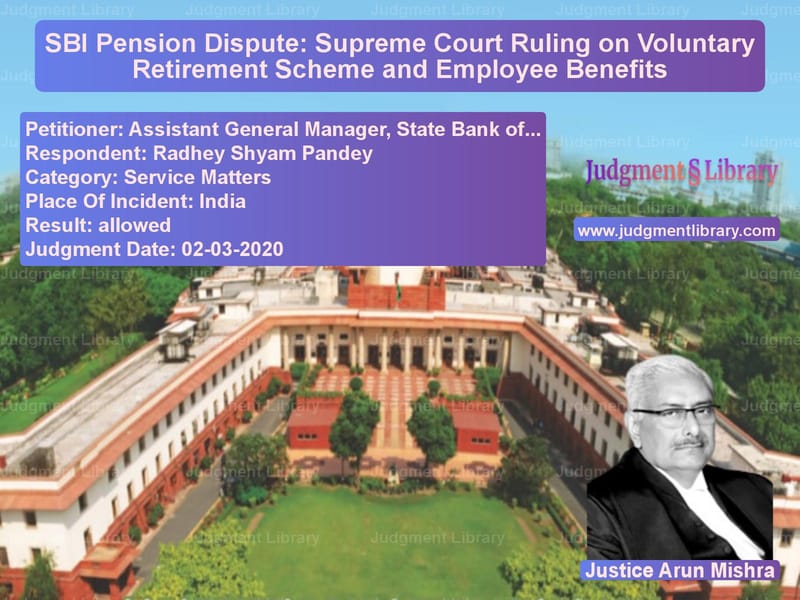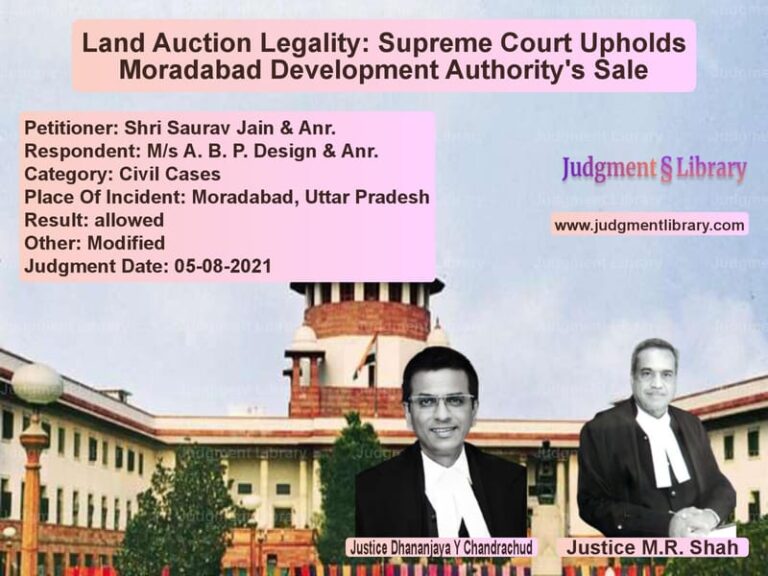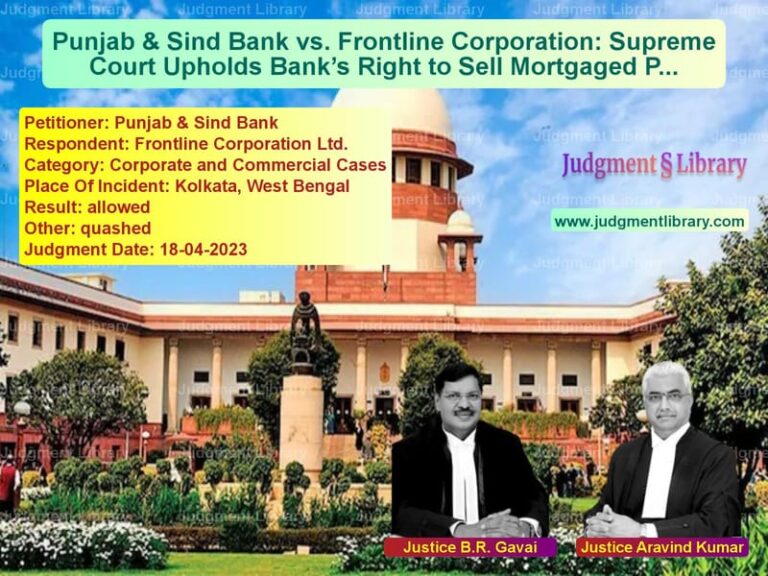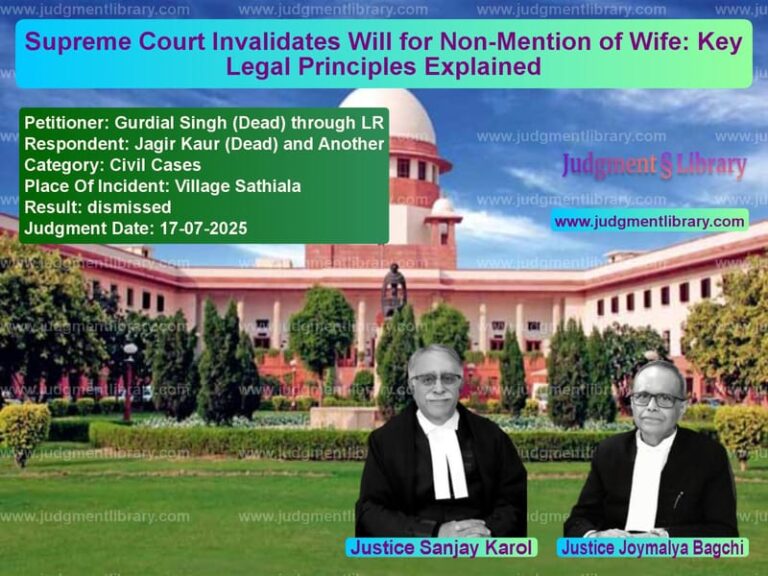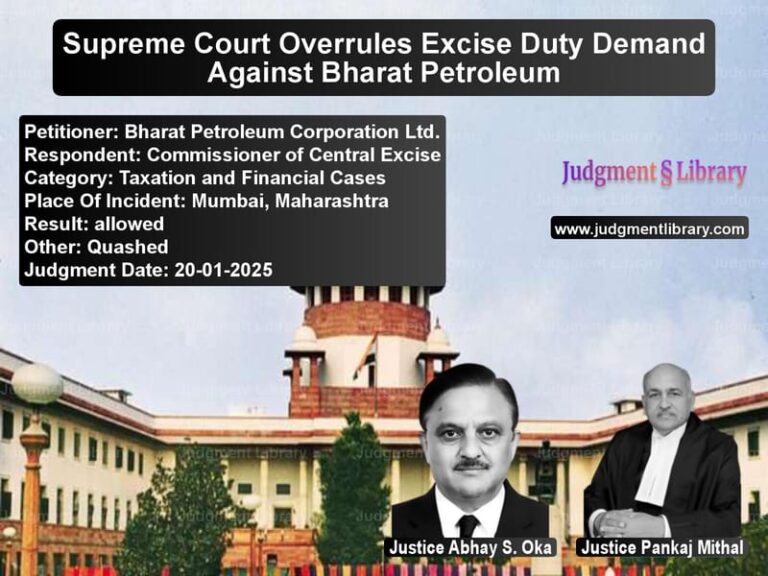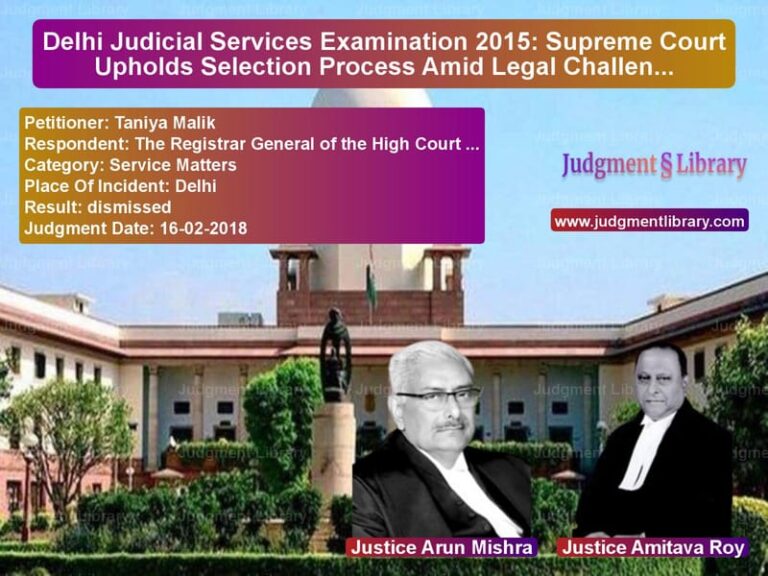SBI Pension Dispute: Supreme Court Ruling on Voluntary Retirement Scheme and Employee Benefits
The present case pertains to the legal dispute over pension entitlement under the State Bank of India (SBI) Voluntary Retirement Scheme (VRS) of 2000. The Supreme Court was tasked with determining whether employees who retired under the VRS after completing 15 years of service were eligible for pension benefits. The case was referred to a larger bench due to conflicting judicial opinions on the matter.
The judgment is crucial for clarifying the legal position of pension entitlement for bank employees who opted for voluntary retirement. It addresses whether pension is a vested right under the scheme or subject to specific eligibility criteria set by SBI.
Background of the Case
The appellant, Assistant General Manager, State Bank of India & Ors., challenged the respondent Radhey Shyam Pandey’s claim that employees retiring under the VRS after 15 years of service were entitled to a pension. The bank contended that the VRS provided ex gratia benefits but did not include pension as an automatic entitlement.
The dispute arose when retired employees under the VRS of 2000 sought pension benefits, arguing that their retirement should be considered as normal superannuation for pension purposes. SBI, on the other hand, asserted that the pension scheme applied only to employees who completed the standard tenure required for pension eligibility.
Petitioner’s Arguments
The counsel for SBI presented the following arguments:
- “The Voluntary Retirement Scheme explicitly provides ex gratia benefits but does not guarantee pension eligibility for employees who retire before completing the standard pensionable service period.”
- “The pension scheme applies only to employees who complete the required tenure as per SBI’s regulations, and VRS retirees fall outside this category.”
- “Granting pension under VRS would be financially burdensome for the bank and contradict the scheme’s original intent.”
- “The provisions of the pension regulations must be strictly interpreted, and voluntary retirees should not be equated with superannuated employees.”
Respondent’s Arguments
The respondent’s counsel countered with the following points:
- “The VRS policy does not explicitly exclude pension benefits, and the ambiguity must be interpreted in favor of employees.”
- “The Government of India had approved the scheme with pensionary benefits, and employees had retired based on this understanding.”
- “A restrictive interpretation of pension rules would violate employees’ legitimate expectations and fundamental rights.”
- “Many other banks with similar VRS policies have granted pension benefits to their employees, and SBI should follow the same principle.”
Key Legal Questions
The Supreme Court analyzed the case based on the following legal questions:
- Does the SBI VRS, 2000, create a vested right to pension for retiring employees?
- Should voluntary retirees be treated on par with employees retiring upon reaching the normal retirement age?
- What is the proper interpretation of pension regulations in relation to VRS retirees?
Supreme Court’s Observations
The judgment, delivered by Arun Mishra, J., included key observations on pension entitlement under the VRS. The Court stated:
“It is imperative to ensure that employees who dedicated their service under the legitimate expectation of receiving pension benefits should not be deprived due to procedural ambiguities. The interpretation of the scheme must align with equitable principles and social justice.”
Further, the Court made the following significant points:
- “Employees who completed 15 years of service under the VRS framework are eligible for pension benefits if the scheme does not explicitly bar them.”
- “The exclusion of pension from VRS retirees contradicts the fundamental principle of fair employment practices.”
- “Financial implications alone cannot be a justification for denying pensionary rights to employees who reasonably expected them at the time of retirement.”
Key Precedents Considered
The Court relied on several landmark judgments to interpret the pension entitlement under SBI VRS:
- State Bank of Patiala v. Pritam Singh: This case established that pension benefits should be interpreted liberally in favor of employees.
- Bank of India v. K. Mohandas: The Court held that contractual ambiguities in employment schemes should be construed in a manner that benefits employees.
- Steel Authority of India Ltd. v. Madhusudan Das: It was ruled that the principle of legitimate expectation applies when employees retire based on assurances from the employer.
Final Decision
The Supreme Court ruled in favor of the respondent, affirming pension eligibility under the SBI VRS, 2000. The Court directed SBI to process pension benefits for eligible retirees and ensure compliance with pension regulations.
The ruling establishes a crucial precedent for public sector banks and their retirement policies, ensuring that employees are not denied pension benefits due to procedural restrictions.
Petitioner Name: Assistant General Manager, State Bank of India & Ors..Respondent Name: Radhey Shyam Pandey.Judgment By: Justice Arun Mishra.Place Of Incident: India.Judgment Date: 02-03-2020.
Don’t miss out on the full details! Download the complete judgment in PDF format below and gain valuable insights instantly!
Download Judgment: Assistant General Ma vs Radhey Shyam Pandey Supreme Court of India Judgment Dated 02-03-2020.pdf
Direct Downlaod Judgment: Direct downlaod this Judgment
See all petitions in Pension and Gratuity
See all petitions in Employment Disputes
See all petitions in Public Sector Employees
See all petitions in Judgment by Arun Mishra
See all petitions in allowed
See all petitions in supreme court of India judgments March 2020
See all petitions in 2020 judgments
See all posts in Service Matters Category
See all allowed petitions in Service Matters Category
See all Dismissed petitions in Service Matters Category
See all partially allowed petitions in Service Matters Category

